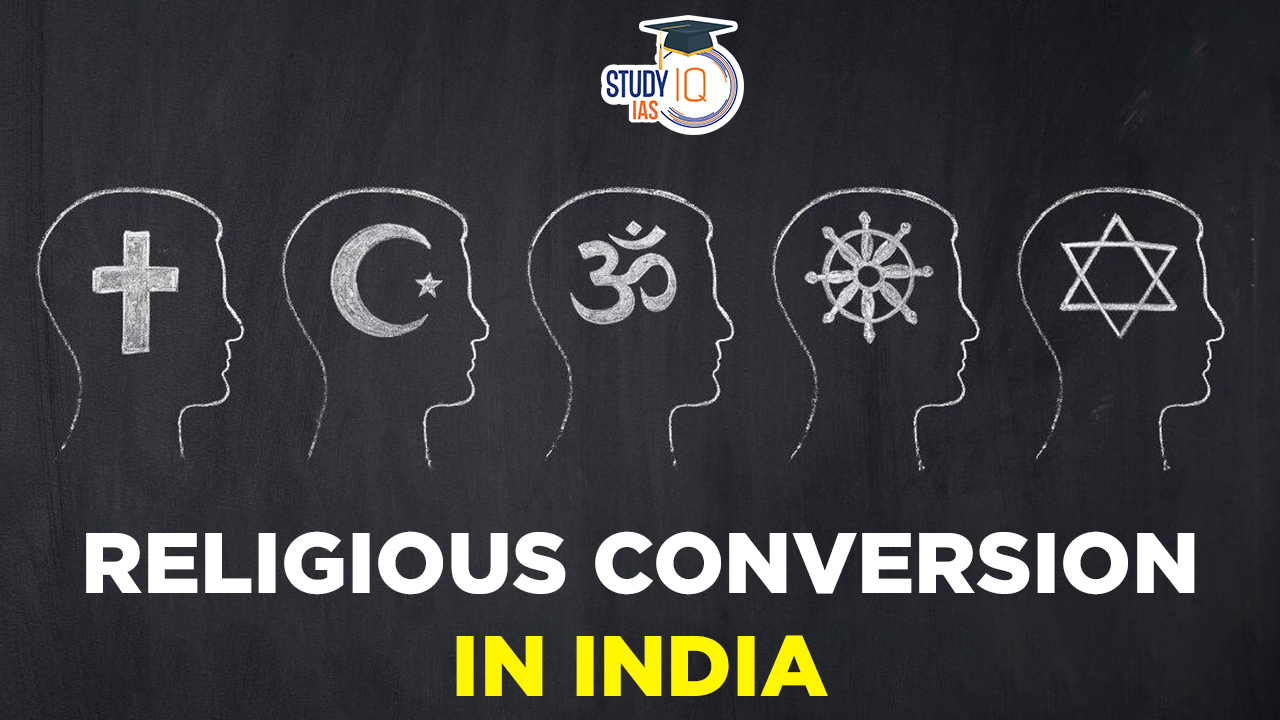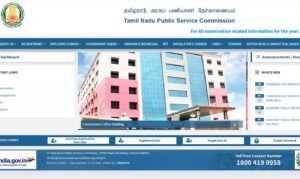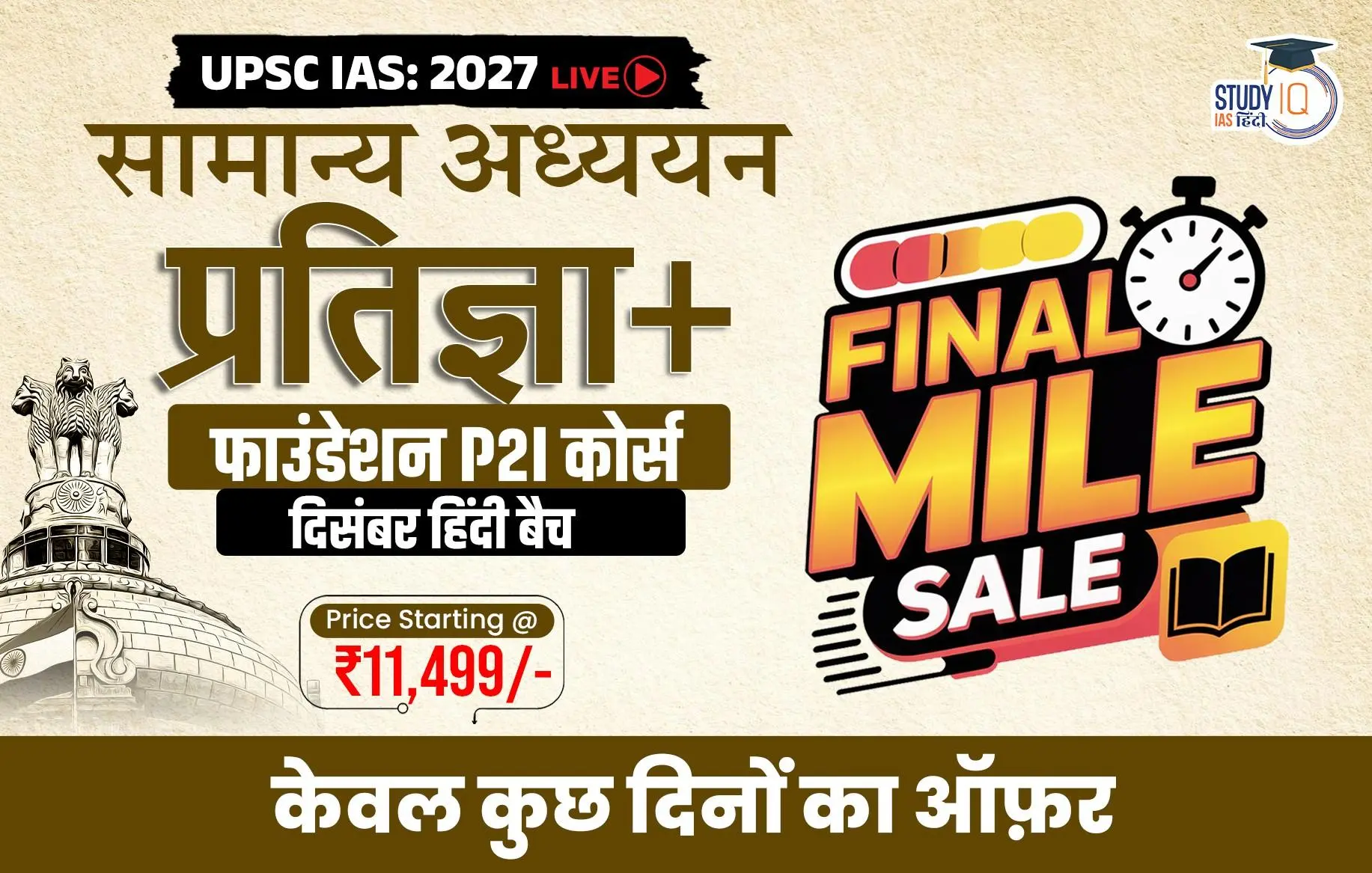Table of Contents
Context: The Uttar Pradesh Government has released figures on conversion cases and arrests made under the Uttar Pradesh Prohibition of Unlawful Conversion of Religion Act between January 2021 and April 2023.
More on the News
- The government stated that majority of cases were reported in Bareilly, and that 185 victims confessed that they were forcibly converted.
- The release of the figures comes against the backdrop of the government backing the controversial film “The Kerala Story”, which is centred around conversions.
What is Religious Conversion?
- Religious conversion refers to the process of changing one’s religious beliefs, practices, or affiliations. It involves the adoption of a new religion or a set of beliefs by renouncing one’s previous religion or set of beliefs.
Reasons for Religious Conversion
There are various reasons why people convert their religion:
- Personal spiritual growth: People may convert to a new religion because they feel that it resonates with them spiritually and helps them grow as a person.
- Marriage: In some cases, people may convert to their spouse’s religion to maintain family harmony or to show commitment to their partner.
- Social pressure: People may feel pressured to convert to a particular religion in order to fit into a certain social group or community.
- Political reasons: Governments or other political entities may incentivize or pressurize people to convert to a particular religion in order to further their own agendas.
- Religious conflict: People may convert to a new religion in order to escape persecution or discrimination based on their previous religion.
- Economic reasons: In some cases, people may convert to a new religion in order to gain access to economic opportunities or resources that are only available to members of that religion.

Has Religious Conversion been mentioned in the Constitution?
- The word “conversion” has not been explicitly mentioned in the Indian Constitution.
- However, Article 25 of the Constitution guarantees the freedom of religion to all individuals, including the freedom to “propagate” their religion.
- The term “propagate” has been interpreted to mean the right to spread or disseminate religious beliefs, and it is often debated whether this includes the right to actively convert others to one’s religion.
Anti-Conversion Laws in India
- Prior to India’s independence, several princely states headed by Hindu royal families enacted laws restricting religious conversions in an attempt to preserve Hindu religious identity in the face of British missionaries.
- These anti-conversion laws were introduced during the latter half of the 1930s and 1940s and were made to protect the cultural identity of the princely states.
- Examples of states that had such laws include Kota, Bikaner, Jodhpur, Raigarh, Patna, Surguja, Udaipur, and Kalahandi, among others.
- Post-independence:
- No Central Law: Currently, there are no central laws restricting or regulating religious conversions. Following India’s independence, Parliament introduced a number of anti-conversion bills, but none were enacted.
- State Laws: Over the years, several states enacted “Freedom of Religion” legislation to restrict religious conversions carried out by force, fraud, or inducements.
- “Freedom of Religion laws” are currently in force in eight states — (i) Odisha (1967), (ii) Madhya Pradesh (1968), (iii) Arunachal Pradesh (1978), (iv) Chhattisgarh (2000 and 2006), (v) Gujarat (2003), (vi) Himachal Pradesh (2006 and 2019), (vii) Jharkhand (2017), and (viii) Uttarakhand (2018).
- The laws passed in Himachal Pradesh (2019) and Uttarakhand also declare a marriage to be void if it was solemnised for the sole purpose of conversion, or a conversion was done solely for the purpose of marriage.
- In November 2019, citing rising incidents of forced or fraudulent religious conversions, the Uttar Pradesh Law Commission recommended enacting a new law to regulate religious conversions. This led the state government to promulgate the recent Ordinance.

Issues with Anti-Conversion Laws
There are several issues associated with anti-conversion laws that include:
- Freedom of religion: Anti-conversion laws can be seen as a violation of the right to freedom of religion, which is protected by international human rights laws. These laws can restrict an individual’s ability to choose their own religion and can be used to suppress minority religions.
- Discrimination: Anti-conversion laws can be used to discriminate against certain religious groups, particularly minority religions. In some cases, these laws have been used to target and persecute minority religious groups.
- Coercion and manipulation: Some people argue that anti-conversion laws are necessary to prevent coercion and manipulation in religious conversion. However, others believe that these laws are often used as a pretext to suppress minority religions and restrict the right to freedom of religion.
- Social and cultural divisions: Anti-conversion laws can contribute to social and cultural divisions within a community or society, particularly if they are used to protect the dominant religion.
- Conflict with other laws: Anti-conversion laws can sometimes conflict with other laws, such as laws that protect freedom of expression or the right to freedom of association.
- Effectiveness: Some argue that these laws are not effective in preventing religious conversion, while others believe that they are necessary to protect the cultural and social cohesion of a community or society.

Judicial Pronouncements on Conversion
- Hadiya vs. Ashokan K.M: The Supreme Court held that an adult has the right to marry and convert to another religion of their choice, and the state cannot interfere with this right.
- Lata Singh vs. State of Uttar Pradesh: The Supreme Court ruled that an individual has the right to marry someone of their choice regardless of their religion, caste, or social status, and any interference with this right is a violation of the right to freedom of choice.
- Sarla Mudgal vs. Union of India: The Supreme Court held that a person can convert to another religion for the purpose of marriage, but the conversion should not be used as an excuse to evade legal obligations or responsibilities.
- S. Pushpabai vs. C.T. Selvaraj: The Supreme Court ruled that an individual has the right to convert to another religion voluntarily, and any coercion or misrepresentation in connection with religious conversion is a violation of the right to freedom of religion.
- Rev Stanislaus Vs Madhya Pradesh, 1977: The Supreme Court concluded that the right to propagate does not include the right to convert.
- Recently, a Supreme Court bench led by Justice M.R. Shah said charity by religious groups is welcome but the intention of such acts cannot be religious conversion. It also held that forced religious conversion is a “very serious issue” which can affect national safety, freedom of religion and freedom of conscience.
Constitutional Provisions on Freedom of Religion
- India has no state religion, nor it patronizes any specific religion. Religion is basically a matter of choice, faith or sets of belief.
- Articles 25 to 28 of the Indian Constitution grant the right to freedom of religion to not only individuals but also religious groups in India.
- Article 25 (Freedom of conscience and free profession, practice, and propagation of religion):
- Article 25 provides the freedom of conscience, the freedom to profess, practice, and propagate religion to all citizens.
- However, these freedoms can be restricted based on public order, health, and morality.
- Article 26 (Freedom to manage religious affairs):
- The right to form and maintain institutions for religious and charitable intents.
- The right to manage its own religious affairs.
- The right to own and acquire movable and immovable property.
- The right to administer such property in accordance with law.
- Article 27 (Freedom from payment of taxes for promotion of any particular religion):
- No person shall be forced to pay any taxes, the proceeds of which are specifically used in payment of expenses for the promotion or maintenance of any particular religion or religious denomination.
- Article 28 (Freedom to attend religious instructions):
- No religion instruction shall be allowed in any educational institution wholly maintained out of State funds.
- This condition shall not apply to an educational institution which is administered by the State but has been established under any endowment or trust that mandates that religious instruction shall be imparted in such institution.
- Individual attending any educational institution recognized by the State or receiving aid out of State funds shall not be required to take part in any religious instruction.


 MP Police Answer Key 2025 Out at esb.mp....
MP Police Answer Key 2025 Out at esb.mp....
 TNPSC Annual Planner 2026 Out: Official ...
TNPSC Annual Planner 2026 Out: Official ...
 SHANTI Bill 2025: India Opens Nuclear Se...
SHANTI Bill 2025: India Opens Nuclear Se...

























